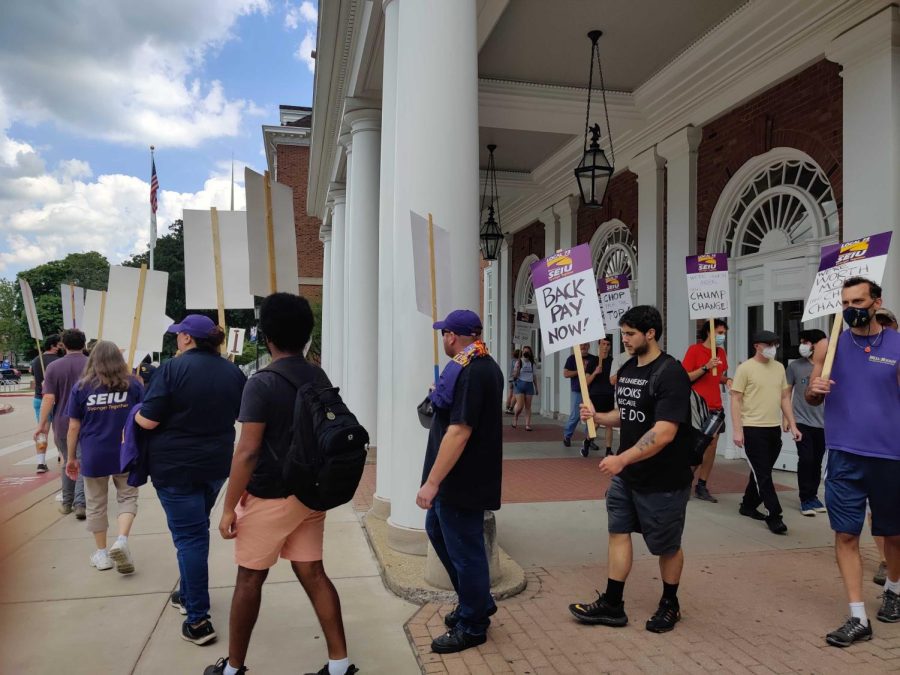UI service workers union holds protest over wage increases, prepares to send strike notice
Service Employees International Union Local 73 protest outside of Illini Union on Thursday for better wages and treatment. SEIU plans ahead with a 15-day strike in the events that an agreement between the union and the University are not met during their upcoming final negotiations on Friday.
Aug 19, 2022
Members of the Service Employees International Union Local 73, which represents University service workers, protested outside of the Illini Union Thursday afternoon ahead of a final set of negotiations on Friday before the union’s current contract expires on Sunday.
According to Michael Lindley, SEIU Local 73 steward and a building service worker at the University, if an agreement isn’t reached, the union intends to send a 15-day strike notice on Monday, the day after their contract with the University expires.
Lindley noted that this does not mean the union is required to go on strike, but is instead “letting the University know a strike is imminent if we can’t come to an agreement.”
“Once those 15 days comes and goes, we can go on strike at any point,” Lindley said. “Obviously, we’re going to continue trying to build a contract. If it doesn’t happen, there’s a work stoppage, so all the members — the building service workers, food service workers — will walk out.”
The union will receive the University’s “last, best and final offer” on Friday, which the union members will then vote on in the following week, Lindley said.
Get The Daily Illini in your inbox!
Along with members from other labor unions on campus, members of SEIU Local 73 expressed their frustration with the University when it comes to wages and contract negotiations at the protest.
At one point, Austin Hoffman, a member of the Graduate Employees’ Organization who was at the protest, pointed out in a speech that Robb Craddock, senior director of labor relations and chief labor negotiator for the University, was standing nearby.
“Yeah Robb, I don’t think you want to clean these buildings or feed these students, do you?” Hoffman asked. “Do you want to teach these students like I do?”
“I want to settle a contract,” Craddock replied.
In May, SEIU Local 73 voted to approve a strike authorization due to a lack of progress in negotiations with the University, with 91% voting in favor of the measure.
Around the same time, the University offered a wage increase of 25 cents per hour for building service workers, which members found “insulting.”
“Basically, they’re not wanting to give us more than 25 cents,” said Jennifer Howard, SEIU Local 73 member and a building service worker at the University. “We asked for five dollars an hour. They keep insulting us — giving us the 25 cents. They’re not going up.”
Howard said the University has the money for the union’s demanded wage increases, noting that the University has offered a 67-cent wage increase for its food service workers.
“They’ve offered 67 cents to food service workers,” Howard said. “They keep treating us like we’re not essential, but we are. They will tell us to our face that they have the money, but they don’t want to give it to us.”
Edward Dawson, SEIU Local 73 member and a building service worker at the University, said this frustration with the University happens every time the union has to negotiate a contract with the University.
“We only get cents on the dollar, and every year you hear about coaches getting 3 million,” Dawson said.
According to Dawson, the union initially proposed a five-dollar wage increase for the first year and a one-dollar increase for the following three years and was willing to discuss lowering the proposed increase.
“We’re like ‘OK then, so how about we move? We go down a dollar — what are you going to do?’” Dawson said. “They still feel this is unreasonable. We were trying to move. They’re not.”
Dawson also noted that inflation has risen sharply in recent years, and the wages offered by the University are not keeping up with the increasing cost of living.
“Since inflation has arisen — and cost of living, food prices, gas prices … we’re only asking for enough money to keep up,” Dawson said. “It’s not like we asked for something that’s outrageous, so I just don’t understand what the holdup is.”






